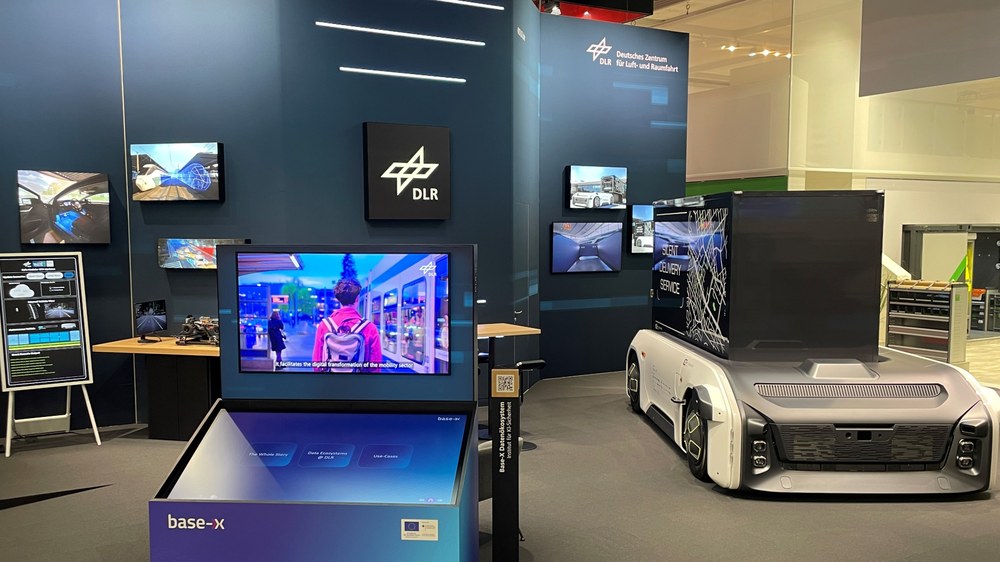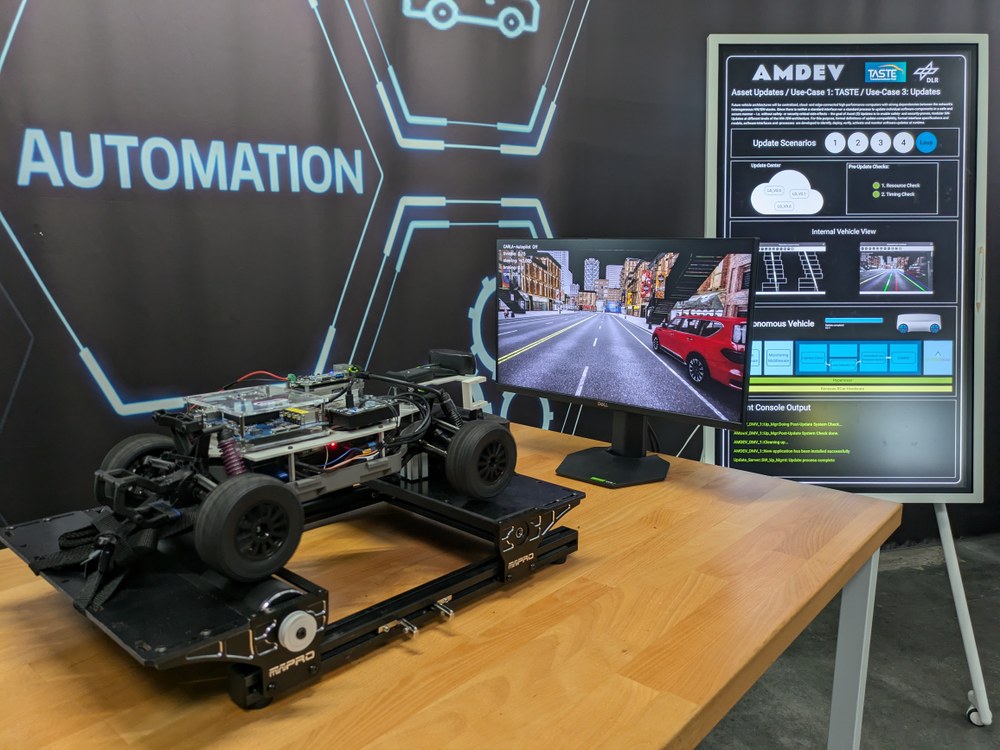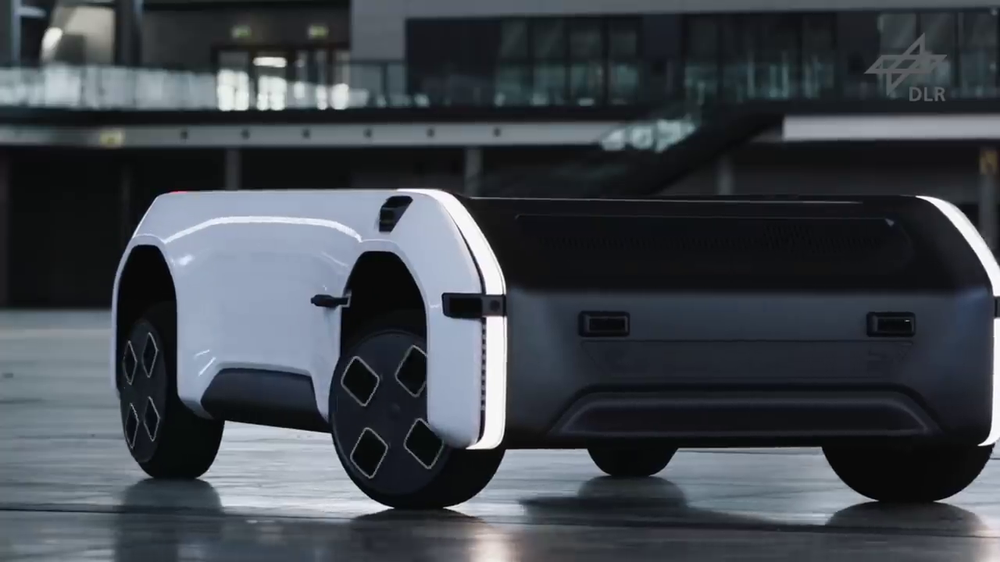DLR at IAA Transportation 2024



- DLR will be showcasing its comprehensive transport research at IAA Transportation 2024 in Hanover.
- A highlight will be the futuristic, modular 'U-Shift' vehicle concept, designed for the autonomous transport of both goods and passengers. The concept also incorporates the implementation of safe vehicle upgrades and features an advanced data integration system to enhance mobility solutions.
- Focus: Transport, mobility of the future
At 'IAA Transportation 2024' – an international trade fair in Hanover centred around logistics, commercial vehicles and the transport sector – the German Aerospace Center (Deutsches Zentrum für Luft- und Raumfahrt; DLR) will present its latest projects and innovative vehicle prototypes, all part of its comprehensive transport research programme. From 17 to 22 September 2024, visitors to the DLR stand (Hall 13, E67) will have the chance to explore the cargo version of the futuristic U-Shift vehicle concept. DLR will also provide insights into its research on the functional safety of autonomous vehicles and its role in the development of a European data infrastructure for cutting-edge mobility services, among other key initiatives.
"DLR's transport research uniquely addresses the mobility needs of both the economy and society, while also advancing the technologies required to move people and goods efficiently, safely, affordably and in an environmentally sustainable manner," explains Meike Jipp, DLR Divisional Board Member for Energy and Transport. "In doing so, we support the transport and commercial vehicle sectors as a consultant, source of ideas and a strategic partner, helping to address current challenges from new business models and the shortage of skilled workers to energy and sustainability issues".
Futuristic U-Shift vehicle concept: flexible and modular for the last mile
With its innovative 'U-Shift' vehicle concept, DLR is breathing new life into tomorrow's logistics and urban mobility. The central feature of the design is the separation of the U-shaped driveboard from the capsule-shaped structures designed to transport both goods and passengers. The driveboard houses all the sophisticated technical components and systems required for autonomous, electric and quiet operation. To maximise economic efficiency, the driveboard is operated around the clock whenever possible. The capsules, which are far cheaper to manufacture, can be customised for a variety of applications – whether as a flexible distribution hub for goods and parcels, a mobile sales outlet or an on-demand shuttle service. By seamlessly combining multiple application purposes, the U-Shift offers a smart, efficient and sustainable solution for a wide range of transport needs. At IAA Transportation, the DLR Institute of Vehicle Concepts is presenting the cargo version of the U-Shift prototype. This version functions as a micro-hub that can be pre-loaded at the warehouse and delivered to the customer's site overnight. The cargo capsule allows for loading and unloading at ground level and can accommodate Euro pallets or mesh trolleys, with a total capacity of up to two tonnes. The U-Shift has already proven its potential in passenger transport: during the German national garden show 2023 (Bundesgartenschau or 'BUGA') in Mannheim, the vehicle had already been successfully operating autonomously for six months carrying test passengers in the context of passenger transport. DLR is now planning further practical trials with the U-Shift and welcomes collaboration with companies, organisations and mobility providers interested in shaping the future of transport.

U-Shift – a modular, autonomous vehicle concept of the future
Your consent to the storage of data ('cookies') is required for the playback of this video on Youtube.com. You can view and change your current data storage settings at any time under privacy.
Secure updates for automotive platforms
Automated driving functions are becoming increasingly important in the logistics and transport sector. As this trend continues, vehicles are evolving into 'rolling computers' that require regular updates. Errors in such updates already result in significant costs and complex recalls. In the future, if updates are to be performed while an autonomous vehicle is in operation, even greater demands will be placed on the process. These updates must be guaranteed to function safely and be executed at the appropriate time. To address this, DLR has developed an updated process along with a reference architecture for modular software updates. This system includes an update management tool that checks in advance whether the vehicle's computing platform has the necessary resources to perform the update, such as sufficient computing power and storage space. If these conditions are met, the new function is transferred to the vehicle's computing platform and installed. Following successful testing, the function is then ready to be activated. At IAA Transportation, the DLR Institute of Systems Engineering for Future Mobility is demonstrating this process using a 1:10 scale model vehicle. The vehicle operates on a roller test stand and is connected to a simulation environment, where it receives an update for the automatic lane detection system. This update process is displayed graphically and interactively on a separate monitor.
Base-X: advanced data integration system for mobility solutions
As part of the European 'Gaia-X' initiative, stakeholders from business, science and government are working together to develop a powerful, competitive, secure and trustworthy data infrastructure. Within this framework, the 'Gaia-X 4 Future Mobility' project family provides both the scientific foundation and practical applications necessary for the digital transformation of the transport system. The goal is to create a marketplace for digital services and solutions that enhance climate compatible and efficient mobility and logistics. Examples include networked mobility services that improve the quality of local public transport and automated services for the last mile. At the IAA Transportation event, the DLR Institute for AI Safety and Security will offer a glimpse into the key outcome of this project family: 'Base-X', an advanced decentralised data integration system. Base-X seamlessly connects existing data and service infrastructures with other open data ecosystems, making it significantly easier to exchange and share data while reducing reliance on large private cloud providers. With Base-X, users can offer and utilise data and services in a self-determined, transparent, secure and cross-border manner. The system supports the development of interoperable and scalable solutions across the industry, fostering innovation and enhancing the autonomy of citizens.
